Welcome back and Happy New Year! The Coalition hopes everyone had a restful, healthy, and happy Holiday Season. As we begin 2017, the Coalition again thanks its members for their strong support over the past year. The Coalition also thanks all the government procurement professionals and other executives who continued the dialogue on our shared goal of improving the federal procurement system.
In 2017, the tension between acquisition streamlining (reducing policy and procedural barriers to the commercial marketplace) and government-unique requirements and processes once again will be at the center of the procurement policy debate. This tension is reflected in this wonderful 1952 cartoon that hangs in the Coalition’s office:
The cartoonist, Earle Chesney, worked with the Veterans Administration and on the Eisenhower White House Staff. During World War II and the Korean War, he served in the Navy, rising to the rank of Captain. As a cartoonist, during World War II, he invented the naval character “Eggburt of the Navy,” a character like the Army’s “Sad Sack.”
The cartoon makes a humorous, yet profound, statement about the federal procurement system. The cartoon’s tag line, “You’ll have to eliminate some hurdles, ‘Uncle,’ if you expect timely performance,” reflects the imperative of reducing government-unique requirements that impact timely, cost-effective contract performance. Mr. Chesney clearly has some experience dealing with the federal procurement system!
Sadly, the cartoon’s message is as true today, as it was in 1952, perhaps even more so. Currently, the sheer scope and complexity of federal acquisition rules and regulations, the increase in government-unique reporting burdens, and the use of non-commercial business practices are significant hurdles in gaining access to, and delivering, best value, commercial products, services, and solutions. This past, however, does not have to be our prologue.
With the Presidential Transition and new Congress underway, 2017 can be an inflection point towards reducing the unnecessary, costly burdens in the federal procurement system. Across the procurement community, there is strong recognition that the current system limits access to the commercial innovation necessary to a host of vital agency missions, not the least of which is ensuring a national defense capability second to none. Congress has embarked on a series of statutory acquisition reforms through the 2016 and 2017 National Defense Authorization Acts (NDAAs). This push for reform will continue in the new Congress as it begins work on the 2018 NDAA.
At the same time, the Section 809 Acquisition Advisory Panel, charged by Congress with reviewing DoD’s acquisition regulations with the goal of streamlining and enhancing access to commercial innovation, will be in full swing. The panel, which is required to issue an interim report this Fall, provides a critical opportunity for the procurement community to work together to identify ways to reduce unnecessary, government-unique burdens that increase costs and limit access to commercial innovation/solutions. In September 2016, the Coalition spoke before the panel on current procurement rules, regulations, and practices that increase costs and barriers to enter the Federal market. Coalition members look forward to working with the panel as it continues its important work in 2017.
Finally, as the Transition takes shape, there will be continuing opportunities to share insights, lessons learned, and feedback regarding the current state of the federal procurement system. Rest assured, the Coalition will continue its laser focus on promoting common sense procurement policies, procedures, and programs that deliver best value mission support for the American people.
Through the FAR & Beyond Blog, we will continue to share ideas and opportunities to improve the federal procurement system. To this end, next week, the blog will share the Coalition’s “Common Sense Procurement Resolutions for 2017.”
